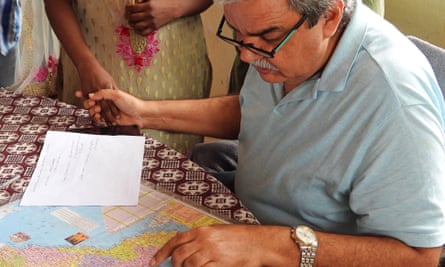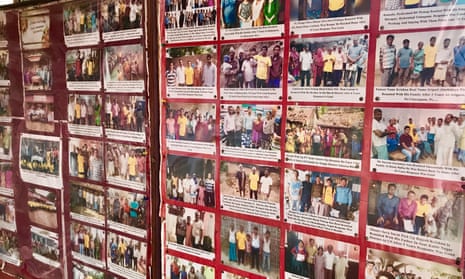To the horror of the watching doctors, a young man on a Mumbai street picked up a broken coconut shell, scooped up dirty gutter water with it, and drank.
“I still recall the scene vividly,” says 61-year-old Mumbai psychiatrist Dr Bharat Vatwani. “My wife, Smitha – also a psychiatrist – and I, watched from across the street.”
Shocked by what they had just witnessed, the couple took the young man to their new private clinic and began treating him for schizophrenia. For Vatwani it was the beginning of a three-decade-long commitment to treating the “wandering” of India – mentally ill people left to roam on city streets – and reuniting them with their families.
As the patient recovered, he began to speak in English and recall bits of information about his family. This enabled Vatwani to locate his kin in the south-eastern state of Andhra Pradesh, a significant distance from Mumbai. “We realised then, that there was no organisation in Mumbai, or for that matter in India, which rehabilitated wandering mentally ill people,” Vatwani says. This incident, which occurred more than 30 years ago, was a turning point in the lives of the psychiatrists.
According to a 2015-16 survey commissioned by India’s government, nearly 15% of Indian adults suffer from some form of mental illness. This translates to more than 180 million people in the country, though only a minuscule number have access to the necessary medical facilities. There is a severe shortage of psychiatrists, especially in rural areas. According to Vatwani, “Over 80% of the government hospitals in India do not have a psychiatrist. One of the main reasons being that many Indian psychiatrists prefer to move abroad, for better prospects. There are less than 4,000 practising psychiatrists in a nation of over a billion people!”
Of the people who do have access to professional help, very few are willing to seek it. Mental illness continues to be largely a taboo subject in India.
Soon after the first reunion, in 1988, Vatwani and his wife, Dr Smitha Vatwani, set up the Shraddha Rehabilitation Foundation. The word “shraddha”, which comes from Sanskrit, means “devotion’”. The foundation has been dedicated to rehabilitating wandering mentally ill people and reuniting them post-recovery with their loved ones.

“85% of the people we pick up from the streets suffer from schizophrenia. I shudder to think of what they must have endured out there, especially the women. They are wandering in all kinds of severe weather – sick, hungry and invisible to the world,” Vatwani says.
After the Shraddha team has picked up a mentally disturbed person, she or he is taken to the residential treatment centre in Karjat, on the outskirts of Mumbai. Vatwani says: “Our medical treatment is coupled with kindness and empathy, which the patient rarely experienced on the streets. Depending on the severity of the illness, the person will spend anywhere between two to three months at the centre.”
Once Vatwani has certified a patient as ready to go home, a social worker who speaks the same language (or a close dialect) as the patient accompanies them home. Recognising the Herculean efforts of Shraddha’s committed team of social workers, Vatwani says: “Sometimes, patients’ families live in the most remote corners of the country and finding them requires some serious deductive work by the team. Often, we have to get the local police involved to locate the relatives.”
Even after the reunion, the patient’s treatment continues as the foundation regularly sends medication to their home.
Shraddha’s rate of reuniting patients with their relatives is a staggering 95%, with more than 8,000 reunions to date, Vatwani says. Some patients have been separated from their families for years, even for decades. Inderjeet Ghai, a 70-year-old from the northern state of Punjab, was reunited with his kin, nearly 54 years after he had gone missing.
Many of the recovered patients have successfully reintegrated into society, with several going on to have jobs and careers. Gangadhar Vinode, 47, who was brought together with his relatives in 1991, after a three-month stay at Shraddha, is today a successful real estate developer in the neighbouring city of Pune.
“In seven out of 10 [reunions], the relatives are overjoyed at having their missing family member back. Occasionally, in the case of female patients, relatives are hesitant to accept them as they are concerned about what people around them will say. In such situations, the accompanying social worker will explain the importance of having the family’s support and involvement, for the patient’s recovery. We’ve mostly had successful [reunions],” says Vatwani.
For his decades of service to this vulnerable section of society, in 2018 Vatwani received the Magsaysay award, widely recognised as Asia’s equivalent of the Nobel prize. “Given the scale of the mental health problem in the country, my contribution is insignificant,” says Vatwani. Despite his humility, however, the award has brought much needed global attention to the cause of wandering mentally ill people, and mental health in general.
“Anyone can be afflicted by a mental illness and end up wandering the streets,” Vatwani says. “Depression, bipolar disorder, schizophrenia, addiction and other neuroses are so common nowadays. People suffering from these problems need as much love and support as those suffering from a physical illness.”
